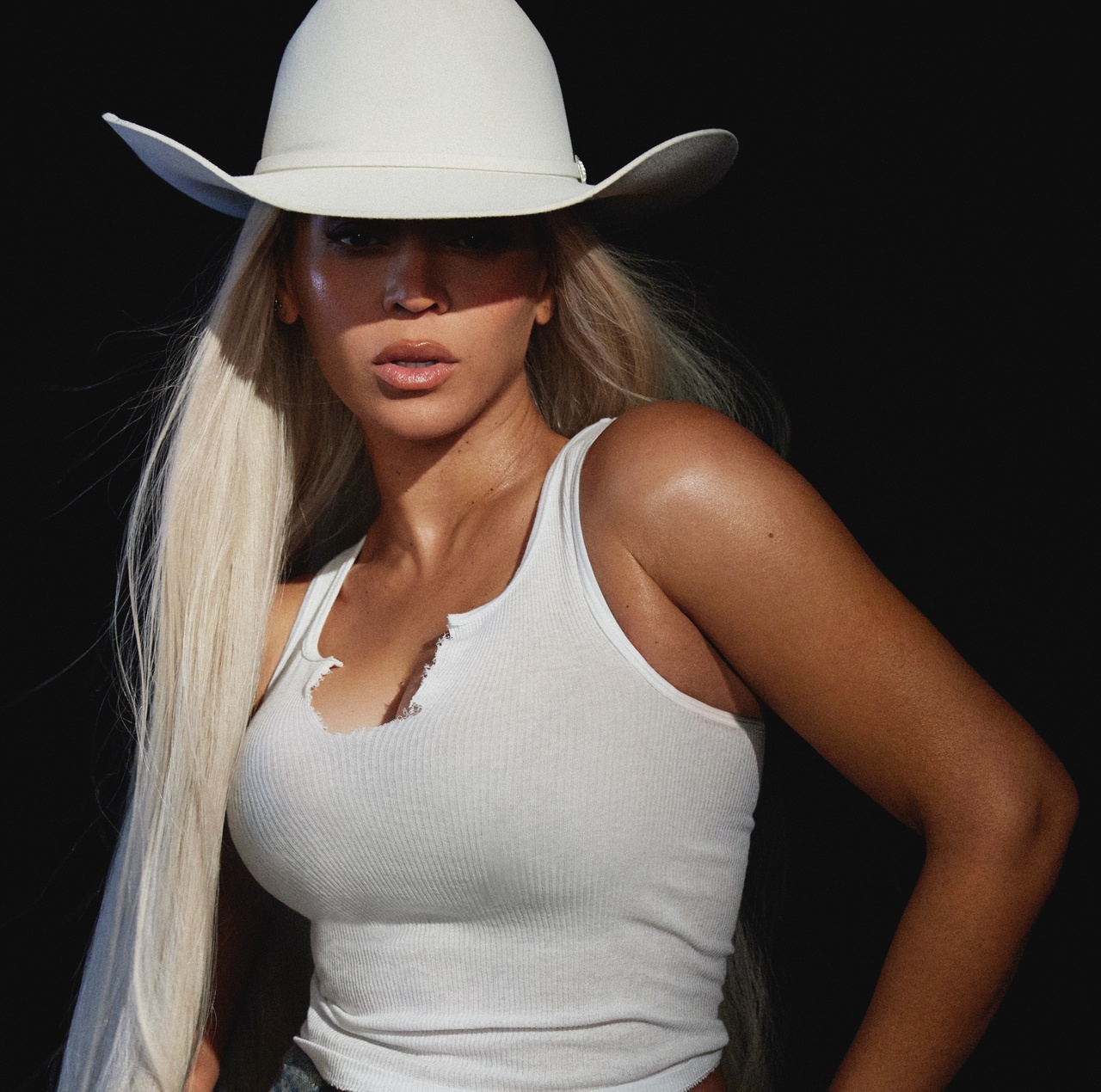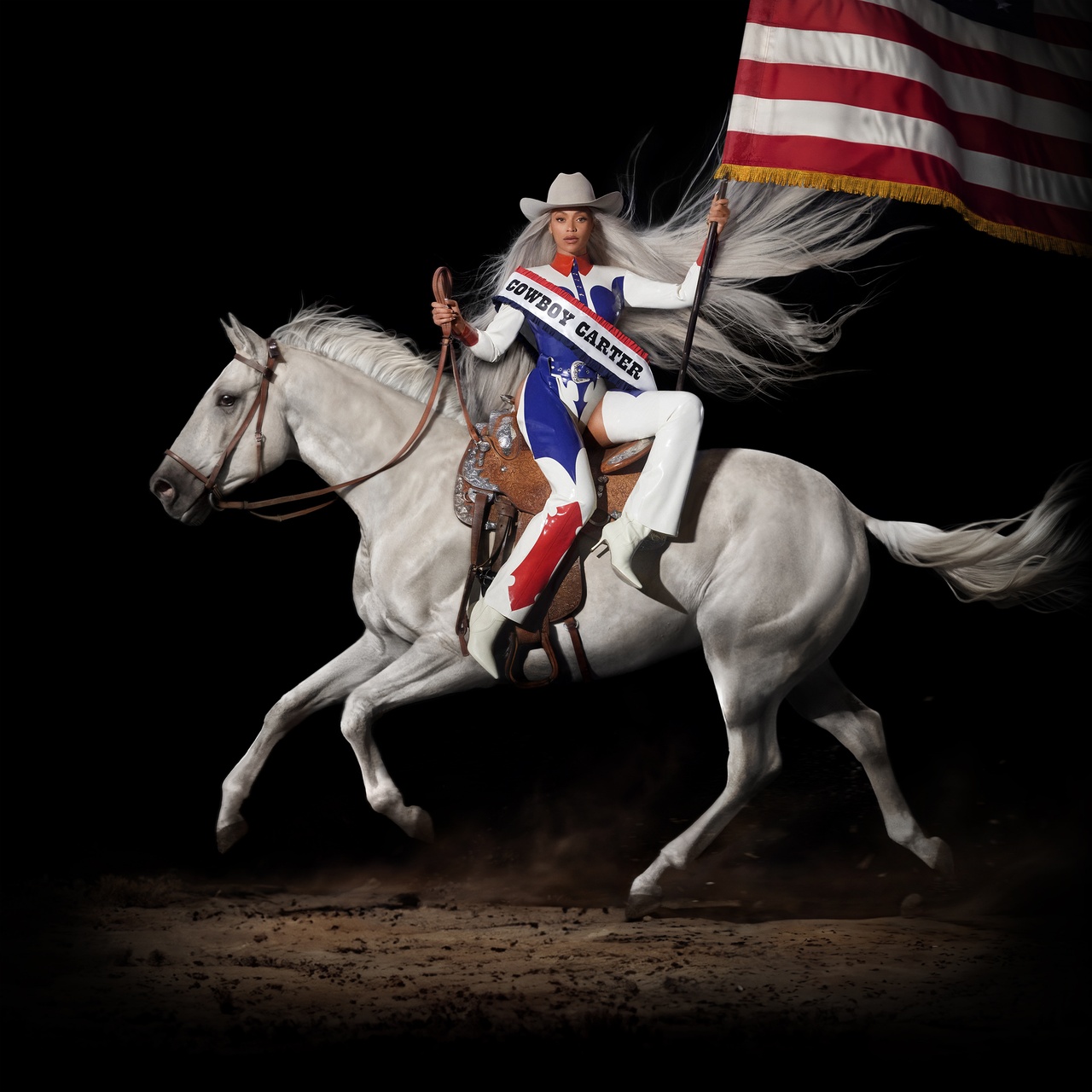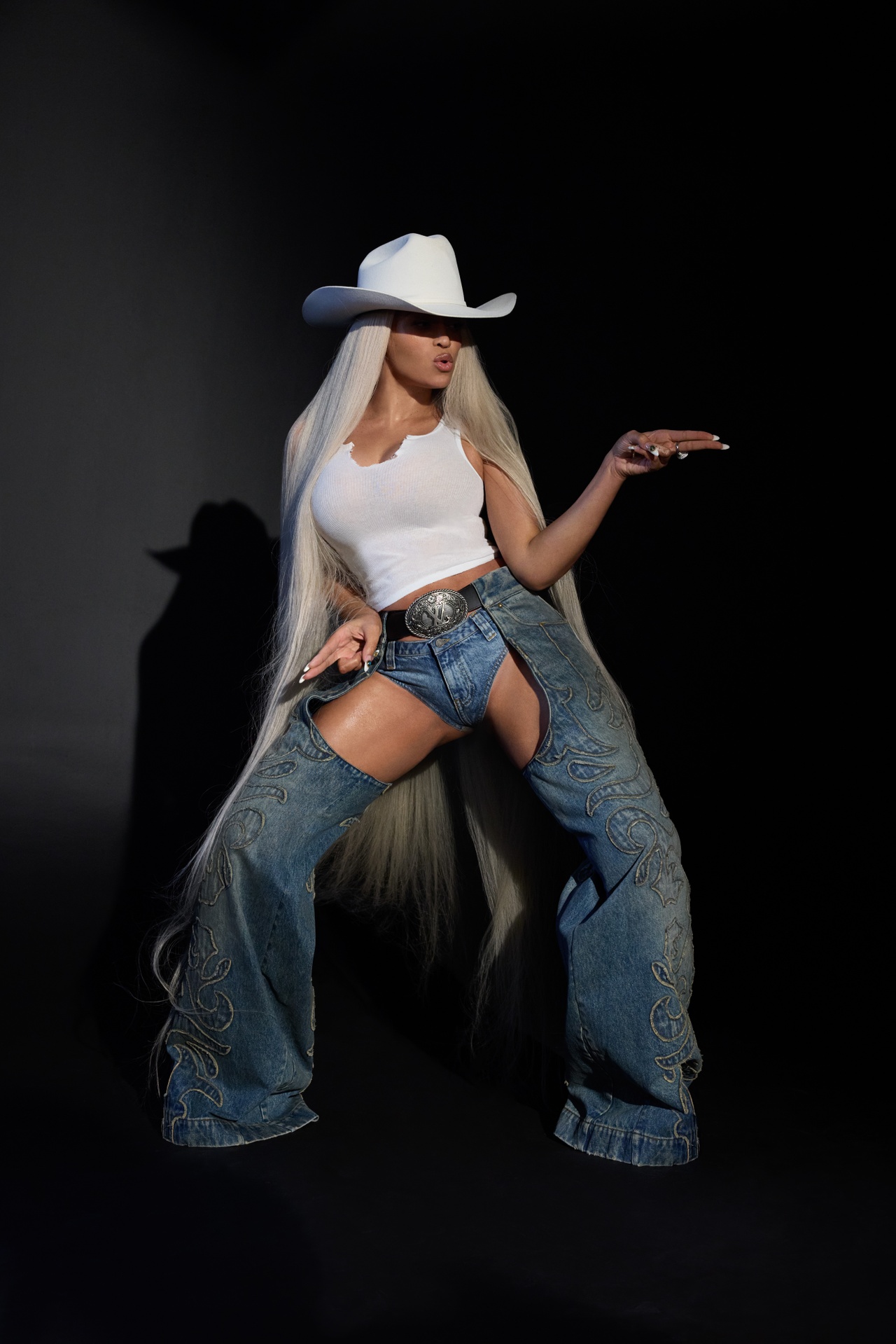LISTENING AS SYMBOLIC REVOLT Tamara Levitz on “Cowboy Carter” by Beyoncé

Beyoncé, 2024
Few artists have the power to shift global discourse like Beyoncé Knowles. As a “pop brand, complete with a model of empowerment that fetishizes capitalist success,” she expertly navigates the industry while revolutionizing it from the inside. [1] Each release, especially since “Formation,” elicits think pieces, syllabi, podcasts, and a staggering richness of social media debate. Queen of the symbolic realm of music and in full creative control of her output, Beyoncé reinvents genres, relationships, the industry, and representational possibilities for Black women.
Released on March 29, 2024, Beyoncé’s Cowboy Carter turned heads as her first country album, igniting a fierce debate on the history of Black people in country music. This was by far not the first time this topic had been addressed, although people acted as if it was. [2] Yet Beyoncé, as always, made the issues sound fresh and new. Having felt and known she was unwelcome in the country community when she did a surprise performance of “Daddy Lessons” with the Chicks at the CMA Awards in 2016, Beyoncé considered this album her way of fighting back and prepared for it with all the thoroughness and musical erudition for which she is known. “Because of that experience,” she wrote, “I did a deeper dive into the history of Country music and studied our rich musical archive. […] The criticisms I faced when I first entered this genre forced me to propel past the limitations that were put on me.” [3] This album was for the people who felt her politics didn’t match the conservative country music scene, or that she was a pop and not a country artist, or that she as a Black woman didn’t quite belong. She called them all out and proved them wrong.
Cowboy Carter demonstrates the affluence and mastery of somebody who has learned she can create whatever music she wants. With the authenticity of a South Texan, opulence of the Queen of Pop, and budget that put no limits on using any producer, performer, or copyrighted material she wanted, Beyoncé created a hyperreal version of country as a model for possible Black futures. She gave the Beatles’ “Blackbird” rich symbolic meaning by tapping into its tradition of being covered by Black artists while trying to outdo the hopeful rising line of the original melody by ending it with the lush harmonies of Black country stars Tanner Adell, Brittney Spencer, Tiera Kennedy, and Reyna Roberts against the nostalgic original backing track of Paul McCartney’s foot tapping. Beyoncé honored Black country history by integrating Linda Martell into the arc of her album’s narrative, as well as by inviting Stevie Wonder to play harmonica on her cover of Dolly Parton’s “Jolene” and Willie Jones to sing on “Just for Fun,” among countless other gestures. Experts have marveled at how knowledgeable and up-to-date Beyoncé was in her approach, experimenting with all subgenres currently circulating while acknowledging her predecessors and fellow artists, inspiring a renaissance of historical and critical work on the genre’s Black legacy. [4]
In all these ways, Cowboy Carter is an extraordinary event. And yet this tells us little about how the album sounds or how listeners may experience it aesthetically. Embedded in a social media culture of Instagram images, YouTube videos, mash-ups, 140-word Twitter/X texts, and instantaneous debate, the album, like most other current music, forfeits its musical autonomy to a culture of signs – its sounds becoming “discursive symbols” that we listen for as we scroll down with our ears. Genre, once defined in part by the recording industry – for example, in the case of country, by executives eager to distinguish white hillbilly from race records in the Jim Crow South – is now identified by hashtag-type cues, branded sounds, algorithms, and tunes so catchy they inspire viral TikTok dance crazes. It’s enough to have a certain kind of storytelling, an identifiable artist, a fashion look, a certain instrument, or perhaps a fleeting vocal sound, twang, or style to have country music – especially when you are as consummate an expert and well-connected businesswoman as Beyoncé Knowles. “This isn’t a country album. This is a ‘Beyoncé’ album,” she proudly announced on Instagram, aware of her single-handed power to conjure a genre in her own name. [5]

Beyoncé, album cover “Cowboy Carter,” 2024
Although the idea of replacing the aesthetic experience of listening to music with scrolling for symbolic cues sounds rather negative, it does not have to be. Kyesha Jennings identifies the hyperlegible, connected digital culture of music I am describing here as immensely positive for Black women. Social media and SoundCloud, Jennings writes, have enabled Black women to “cultivate community,” challenge respectability politics, explore ratchetness, and “co-opt pleasure politics for the purpose of celebrating behaviors that are often demeaned by broader culture.” [6] Beyoncé participated in this space in 2012, for example, when she posted herself with “ratchet” earrings on Instagram, and in 2014, when she was featured on Nicki Minaj’s “Feeling Myself.” But she has also repeatedly embodied the respectability politics Hip-Hop feminists seek to challenge. [7] For this reason, it has at times been difficult to discern her relationship to a Black feminist politics of pleasure, which, in Brittney Cooper’s interpretation, involves “Black women being able to fully embody an epistemological space” by engaging in real talk about their intimate lives, and without which there can be no justice. [8]
Can Beyoncé articulate such a politics of pleasure in the hypercommercialized, discursive form of Cowboy Carter? This depends on whether her revolution is merely symbolic, or effective in creating material change precisely because it is symbolic. [9] Take, for example, her cover of Parton’s 1973 song “Jolene,” in which Parton pleads with a woman with auburn hair not to take her man, the intensity of her description of her rival’s features inviting queer readings of the song. [10] I found it quite jarring to hear Beyoncé and her producers use only the most identifiable riff of the original old-time music from Parton’s version, which highlighted Chip Young playing an intricate fingerpicking pattern accompanied by Wayne Moss on a second acoustic guitar. It was as if the producers wanted listeners to identify the cue rather than enjoy and immerse themselves in the style. In spite of Beyoncé’s claim that she wanted to “go back to real instruments,” use sounds that are “organic and human,” and keep some songs “raw,” her “Jolene” feels highly produced, the music-making of the past replaced by expert curation of handpicked iconic references. [11]
Beyoncé’s clean, subdued performance of the first line of the opening chorus lacks the heartache and vulnerability of the ecstatic burst of Parton’s original – beautifully re-created by Miley Cyrus in her live covers. I also missed in Beyoncé’s vocal performance – disrupted at various points by a male voice reiterating the name “Jolene” – what Zachary Wallmark has analyzed as the power of timbral effects of the voice and vocables to add expression and meaning to a song. [12] The fiddle line driving Parton’s original rising line is likewise replaced by Stevie Wonder on a distant harmonica vaguely reminiscent of the soprano recorder in Ennio Morricone’s iconic score for the spaghetti western The Good, The Bad, and the Ugly, exuding a vibe of Beyoncé and Jay-Z as Bonnie and Clyde–type outlaws. Here and in the song’s form, Beyoncé seems intent on not allowing the song to build up, instead slowing it down also with a bridge and the supportive response of male voices. Beyoncé’s old-school, threatening defense of her marriage to Jay-Z – while convincing as a reaction to his earlier infidelity, which she had first processed on Lemonade – left me cold in terms of the Black feminism evoked above, and in light of Parton’s original queer performance. I found myself turning to Lil Nas X’s performance of “Jolene” and listening for the “queer entanglement” of him pleading with Jolene for “his man.” [13] Beyoncé, by contrast, had created a symbol of the song as now heteronormative and Black, seemingly in line with respectability politics. What had once allowed me as a listener to cathect with it – its ephemeral vocal sounds, ecstatically rising line, infectious rhythmic energy, intense musical collaboration, and queer possibility – is gone.
But what if I have misread Beyoncé? What if she is knowingly countering my expectations with gestures that point symbolically to Black traditions and forms of Black heteronormative intimate pleasure I do not know, and asking me to question my personal memories and aesthetic preferences rather than indulge in them? How can I hear Black country if I cling to aesthetic traditions historically associated with whiteness, and thus comfortable and familiar to me (especially in prioritizing an artist like Miley Cyrus, known for appropriating twerking and for her beef with Nicki Minaj)? I recognize that there is no respite in a world in which all sounds carry symbolic meaning, and that my personal aesthetic choices will have to succumb to the power dynamics of a digital music culture that now offers new paths to social justice through music.

Beyoncé, 2024
Beyoncé is the queen, I conclude, her mastery of the symbolic universe of music enabling her to teach us, guide us to new genres and histories, and consistently challenge our listening habits, even when we don’t agree with her. Adapting music to social media with what Jennings calls a digital feminist sensibility, she sparks our cognitive interest in identity as it intertwines with genre and asks us to imagine the possibility of achieving social justice in the symbolic realms of capitalism, leaving us intellectually unsettled. In this way, she revolutionizes how we may think discursively about country music before gently guiding our hearts and ears to follow. In a world in which music has fused with social media, such a symbolic revolt does indeed, in my view, have the power to change country music forever.
Beyoncé, Cowboy Carter, Columbia, Parkwood Entertainment, 2024.
Tamara Levitz is a professor of comparative literature and musicology and is chair of the Department of Comparative Literature at UCLA. For the past decade, she has researched structures of white supremacy and racial exclusion in the formation of music disciplines in the United States. She is currently working on a series of articles on how comparative methods developed within the settler colonial system of education in the United States in the first part of the 20th century.
Image credits: Parkwood Entertainment
Notes
| [1] | Inna Arzumanova, “The Culture Industry and Beyoncé’s Proprietary Blackness,” Celebrity Studies 7, no. 3 (2016): 422. |
| [2] | See, for example, Karl Hagstrom Miller, Segregating Sound: Inventing Folk and Pop in the Age of Jim Crow (Durham, NC: Duke University Press, 2010); Diane Pecknold, ed., Hidden in the Mix: The African American Presence in Country Music (Durham, NC: Duke University Press, 2013); and the important work of Santi Elijah Holley. |
| [3] | Beyoncé Knowles-Carter (@beyonce), Instagram post, March 19, 2024. |
| [4] | See, for example, Jon Caramanica with Marcus K. Dowling and Julianne Escobedo Shepherd, “Beyoncé, ‘Cowboy Carter’ and Filling in History’s Gaps,” April 9, 2024, in Popcast, New York Times, produced by Pedro Rafael Rosado, podcast, 77:00. |
| [5] | Knowles-Carter, Instagram post, March 19, 2024. |
| [6] | Kyesha Jennings, “City Girls, Hot Girls and the Re-Imagining of Black Women in Hip Hop and Digital Spaces,” Global Hip Hop Studies 1, no. 1 (June 2020): 47–70, at 52. |
| [7] | Brittney C. Cooper, “Disrespectability Politics: On Jay-Z’s Bitch, Beyoncé’s ‘Fly’ Ass, and Black Girl Blue” [2012], in The Crunk Feminist Collection, ed. Brittney C. Cooper, Susanna M. Morris, and Robin M. Boylorn (New York: The Feminist Press, 2017), 181–84. |
| [8] | Joan Morgan, Brittney Cooper, Treva Lindsey, Kaila Adia Story, and Esther Armah, “The Pleasure Principle: Articulating a Post–Hip Hop Feminist Politics of Pleasure,” in Freedom Moves: Hip Hop Knowledges, Pedagogies, and Futures, ed. H. Samy Alim, Jeff Chang, and Casey Philip Wong (Berkeley: University of California Press, 2023), 363. |
| [9] | For one of many critiques of Beyoncé’s politics, see, for example, Ajamu Baraka, “Beyoncé and the Politics of Cultural Dominance,” Counterpunch, February 11, 2016. |
| [10] | Nadine Hubbs, “‘Jolene,’ Genre, and the Everyday Homoerotics of Country Music: Dolly Parton’s Loving Address of the Other Woman,” Women and Music: A Journal of Gender and Culture 19 (2015): 71–76. |
| [11] | Santi Elijah Holley, “On ‘Cowboy Carter,’ Beyoncé’s Country Is as Broad as the Public She Serves,” NPR, April 3, 2024. |
| [12] | Zachary Wallmark, “Analyzing Vocables in Rap: A Case Study of Megan Thee Stallion,” MTO 28, no. 2 (June 2022). |
| [13] | Lauron J. Kehrer, Queer Voices in Hip Hop: Cultures, Communities, and Contemporary Performance (Ann Arbor: University of Michigan Press, 2022), 128–30. |

